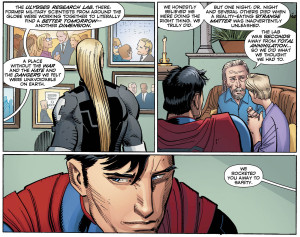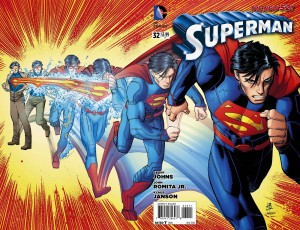 Reading the third issue of Geoff Johns and John Romita Jr.’s Superman, I found myself both enjoying the issue and fascinated by the ways in which Romita’s art — with the lovely Klaus Janson inks that give it a rougher, blockier edge than other inkers, and Laura Martin’s bright colors — disguise the fact that, in many ways, “The Men of Tomorrow” is both a Greatest Hits of Recent DC Superman Stories and the chance to finally move past a lot of tropes that are beginning to feel a bit tired.
Reading the third issue of Geoff Johns and John Romita Jr.’s Superman, I found myself both enjoying the issue and fascinated by the ways in which Romita’s art — with the lovely Klaus Janson inks that give it a rougher, blockier edge than other inkers, and Laura Martin’s bright colors — disguise the fact that, in many ways, “The Men of Tomorrow” is both a Greatest Hits of Recent DC Superman Stories and the chance to finally move past a lot of tropes that are beginning to feel a bit tired.
By the end of #34, the third issue in the run (out tomorrow, so I’ll avoid spoilers), we’ve finally met the villain of the piece but the overall arcs of the run remain unchanged: Superman has discovered Ulysses, who is essentially an alternate version of himself but from Earth, presenting us with two very, very familiar Superman themes at this point:
• A Superman (or, in this case, Superman analogue) who might not be trustworthy, and
• A Superman who gets to go home
The former is something that DC has become increasingly fascinated with. Both Earth-2 and Injustice feature Superman-Gone-Bad as a major plot point, after all, and in the “main” DCU, Grant Morrison’s run finished with the New 52 Superman facing off against the weird genericized Superman monster from the alternate world (All-Star Superman also featured the hilariously Scottish Kryptonian heavies).
The latter, meanwhile, may be a lesser Superman trope but one that Geoff Johns set in motion at the very end of his Action Comics run some years back, when he brought back the Kryptonians from the shrunken Kandor and set the “New Krypton” storyline in motion (A storyline that, while it does fall apart at the end, is as close to 52 as DC has managed since that series ended, I maintain).
With “The Man of Tomorrow,” Johns definitely isn’t breaking new ground in terms of plot, but there’s something to be said about the execution. By bringing in Ulysses — and also with the introduction of the villain in #34, who has a certain level of deja vu to those readers who remember Infinite Crisis’ “Sacrifice” storyline — Johns gets to have his cake and eat it too, creating a way in which to explore those themes without actually altering the classic Superman status quo in any way. In fact, as the scene in the Daily Planet in the first issue showed, he’s seeming reconstructing that status quo, which has fallen into disrepair in the New 52.
 Because of this — and, in many ways, because of the way in which Superman is essentially a passive observer for much of these three issues to date — Johns’ Superman is the most Silver Age he’s written so far, and the most traditional version of the character seen since Morrison jumped ship (As I said in the podcast, the Calvin Ellis Superman in Morrison’s The Multiversity is very Silver Age, too, in many ways). He’s not the Silver Age Superman — I suspect that Johns is too enamored with the melodramatic character dynamic and angst of the 1980s to deliver the hyper-competent, paternal Superman of the ‘50s and ‘60s — but he is kinder, calmer and quieter than might have been expected from Johns’ previous outings with the character.
Because of this — and, in many ways, because of the way in which Superman is essentially a passive observer for much of these three issues to date — Johns’ Superman is the most Silver Age he’s written so far, and the most traditional version of the character seen since Morrison jumped ship (As I said in the podcast, the Calvin Ellis Superman in Morrison’s The Multiversity is very Silver Age, too, in many ways). He’s not the Silver Age Superman — I suspect that Johns is too enamored with the melodramatic character dynamic and angst of the 1980s to deliver the hyper-competent, paternal Superman of the ‘50s and ‘60s — but he is kinder, calmer and quieter than might have been expected from Johns’ previous outings with the character.
That kind of hero may not necessarily square with Romita Jr.’s artwork, at least in theory — Romita Jr. is an extremely dynamic, overblown artist in the best possible way; his characters overact, and feel constrained and uneasy when not in motion. And yet, there’s enough action in the stories to show off those chops (even if it’s not necessarily the action you’d expect — Superman running through a room changing his costume, say, or flashbacks to Ulysses being sent from Earth), and somehow the tension Romita brings to the quieter scenes adds something to the experience, rather than contradicting it.
That tension also, as I said above, disguises Johns’ story in some way. You expect something to happen at any moment, but the dramatic moment in the scene is Superman being told that he’s welcome in someone’s home, or something equally… small. What should feel like a disconnect in tone between the story and art instead works to the overall comic’s benefit; there’s a sense of uncertainty and surprise in what is, in many ways, an extremely conservative, traditional comic. Johns is putting the toys back where they “belong,” and yet the whole thing reads fresher and more exciting than that exercise should be to jaded eyes. I know where he’s going, ultimately, but I can’t quite tell how he’ll get there.
Whether or not this balancing act will be able to be sustained long term isn’t clear — we have no idea how long either Johns or Romita Jr. are staying on the title for, or whether the bloom will fall off their rose sooner rather than later — but for now, Superman is one of DC’s most curious books, even though it’s not necessarily doing anything new, per se. Whatever happened to the man of tomorrow, indeed.


Great analysis of the dynamic underpinning these issues, Graeme. (I’ve only read the first two but the third sounds remarkably similar.) I keep waiting for the penny to drop, for Ulysses’ heel turn, or some other event that is going to crank up the urgency–that it sounds like it hasn’t happened yet is both intriguing and maybe a little troubling. The longer that kind of mood goes on, the more surprising the change-up is going to have to be.
Yeah, good going Graeme. I just wish poor John Romita Jr didn’t have to draw that godawful New 52 costume, it’s painful to look at.
Mind, he has no one but himself to blame for Ulysses’ Rapunzel do.
Thanks a lot, Graeme.
Because of your review (and confirmations on Savage Critic) I took a risk and picked up Superman 32-34 ($12.64) and really enjoyed them. And now I have a new book on my pull list. My basement is already overflowing with comics.
I initially avoided this Superman run like the plague, due to my general hatred of the “New 52” and my growing dislike of Johns’ *EXTREME* stories. Johns’ usual angsty and violent storytelling seemed like the wrong fit for how I like my Superman stories — positive, heroic, and taking the higher ground. Superman is better than you are, which is a point modern writers often miss.
But this story (so far) hits the mark. Uber-competent Superman *is* better than you are. Better yet, Clark is competent too. He finds a way to succeed, even when so solution is obvious, or at least I’m projecting that he will. We’ll see if Johns fills this expectation. I’ve got my fingers crossed.
That’s “no solution”. Stupid typos. Dasbender is drunker than you are.
I meant to follow this up with a question: why is it that when uber-competent Batman saves the day people think he’s bad-ass, but when Superman is portrayed as uber-competent people call it “boring”?
The fantasy of Superman is of being a genuinely decent human being who helps people out.
The fantasy of Batman is people revering you despite being kind of antisocial.
Sherlock Holmes (pick any incarnation) wouldnt be nearly as captivating if the detective was a super affable, humble dude with a tonne of empathy.